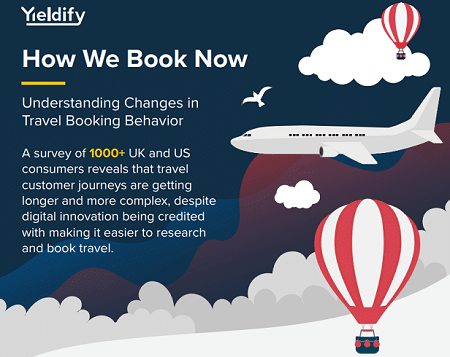
As the peak holiday season approaches, marketing tech company Yieldify has commissioned original research showing 41.7% of consumers take longer booking travel then five years ago.
Key highlights:
• Driving this increase in time spent researching and booking travel is the ‘self service’ nature of travel today – 48% of consumers now book each part of their travel separately.
• Digital travel is a victim of its own success: as the number of travel websites has exploded so too has ‘analysis paralysis’ – more than half (50.15%) of consumers visit more sites than 5 years ago, and 78% of travellers say they now visit multiple sites when deciding where to go.
• These trends have resulted in more than 4 in 10 (42%) of consumers agreeing that the process of researching or purchasing travel online is fragmented and complex
The report, ‘How We Book Now’, shows that nearly half (41.7%) of consumers spend more time on research and booking than they did five years ago, with the average consumer now researching their next trip 4.19 months before departure.
The new report found that this increase in time spent by consumers is being driven by two main behavioral trends. Firstly, with consumers now acting as their own travel agents – many of them (48%) booking each part of their vacation separately – there are multiple purchase journeys to each trip. This has resulted in more than four in ten (42%) agreeing that the process of researching or purchasing travel products online is fragmented and complex.
Secondly, digital travel is a victim of its own success: as the number of travel websites has exploded, the research stage of the customer journey now has no limits. This leads to ‘analysis paralysis’, as more than half (50.15%) of consumers visit more or many more sites than 5 years ago, and 78% of travellers say they now visit multiple sites when deciding where to go. This means a longer booking funnel, with more work for consumers, and more chances to lose them.
When it comes to actually securing the booking, competition on price is no longer the only option for travel brands. While price still has a larger role in attracting consumers to travel sites, it only just edges out previous experience (48.6% vs 45.7%). Price is less influential when it comes to actually securing the booking, where it’s previous experience (45.7%) and reviews (41.3%), rather than price (39.4%) that are more influential.
Wai Lin Yip, Corporate Director of E-commerce at Arlo Hotels, and contributor to the report added: “Travelers these days are very savvy. One of the biggest challenges for any travel brand is encouraging customers to book directly so that they can capture data and use it to build customer loyalty and ensure repeat business. What this report shows is that these booking journeys are so long and complex that attracting and sustaining attention demands a personalized approach.”
But with over a third (35%) of consumers saying that they’re not comfortable with brands collecting and sharing their data, getting personalization right is a challenge. Yet there is hope – 80% of travellers are broadly in favor of a personalized experience when booking travel – but if they get something in return, such as reduced prices or special services. This is not surprising, given that many applications of personalization seek to simplify the customer journey – reviews (66.7%), real-time availability (61.1%) and personalized loyalty schemes (66.6%) were all rated positively.
Mark Murray, Head of Travel at Yieldify, said: ‘The results of the study really confirm the trends that we’ve seen amongst many of our travel clients over the last year: as research and booking options proliferate, there’s a need to shift toward personalization strategies that improve the customer journey, making it easier for consumers to discover and purchase the right travel products.”
The full report is available at this link.
This research was conducted by Censuswide, an independent market research consultancy, with 1005 Respondents who have researched and purchased travel related products online in the last 12 months: 503 in the UK and 502 in the US. Fieldwork was carried out between 09.05.2019 – 14.05.2019. Censuswide abide by and employ members of the Market Research Society. All survey panellists are double opted in, which is in line with MRS code of conduct and ESOMAR standards.
